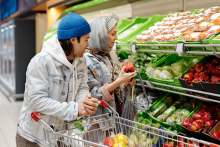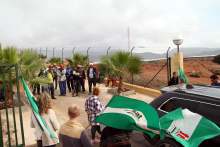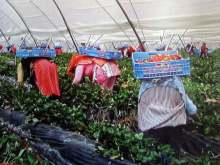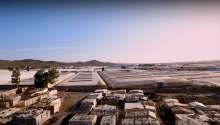UK supermarkets depend on the regions of Almeria and Huelva in southern Spain to supply them with fresh fruit and vegetables. But for two decades, farm owners in these regions have been violating the rights of migrant workers who pick this fresh produce.
Campaign: The fight for agricultural workers’ rights in Spain
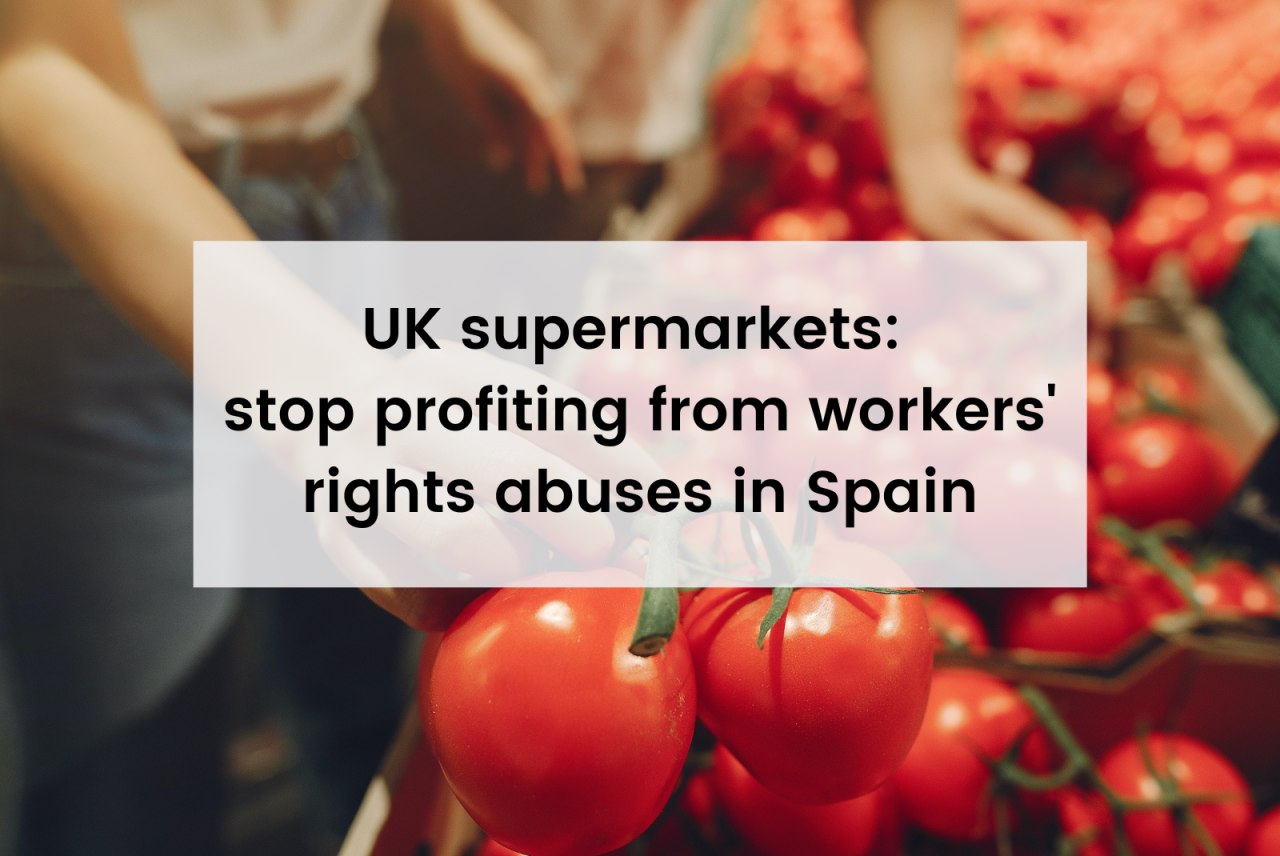
Ethical Consumer is asking supermarkets to take responsibility for the rights of migrant workers who grow their fruit and vegetables.
What problems do workers face?
Eight out of nine basic workers’ rights are being broken in southern Spain, from forced labour to unsafe working conditions.
Farm owners routinely refuse legal wages, penalise workers for taking toilet breaks, fire those who try to unionise, and sexually assault and harass workers.
UK supermarkets claim to champion fundamental workers’ rights, but have failed to take adequate action to address the risk of widespread abuse in their supply chains.
Read our Produce of Exploitation report for detailed research on these issues.
Urgent Action
We’re calling on UK supermarkets to act.
Sign the Anti Slavery International petition to pressure supermarkets to take responsibility and ensure decent living conditions for the workers who grow their – and our – produce.
Read more about the living conditions and how the supermarkets are breaching UN human rights commitments in our latest article.
Problems faced by workers
Working conditions in Huelva “routinely” amount to forced labour, according to the UN special rapporteur on extreme poverty and human rights.
Workers are regularly recruited under grossly misleading contracts and then face barriers to leaving. In 2019 the European branch of La Via Campesina reported that there were, “Numerous reports of passport retention and late delivery of final salary payments, pay slips and work certificates, given only upon boarding the bus to return home, to prevent the “escape” of seasonal workers.”
In 2019 ten women in Huelva filed a lawsuit claiming they had been trafficked, assaulted and exploited while picking strawberries in Huelva. EuroNews interviewed the ten women: “They talked about not getting paid and going hungry, to the point of searching for food in garbage bins. They spoke of forced prostitution and used the word “slaves” multiple times to describe their time on the farm, and said that coming to Spain had destroyed their lives.”
Workers in both Almeria and Huelva repeatedly report being refused the right to join unions. In Almeria, union busting and strike breaking is common, and in Huelva workers are unable to unionise due to the nature of their contracts.
Workers have reported aggressive and blatant strike-breaking, being fired for strike involvement, and even being hit by the vehicle of a company manager while picketing.
The fact workers are likely to move regularly means that they may not understand their union rights and makes forming and maintaining unions challenging. The temporary nature of their employment and most contracts allows employers to treat them as ‘disposable’, and leaves the workers feeling unable to demand better conditions.
Many workers face consistently gruelling conditions. Workers describe working long days with just a 30 minute break in extreme heat. Workers have also reported that some farms have rules prohibiting them from carrying water in the greenhouses, despite the high temperatures, allegedly on the grounds of health and safety concerns.
In both 2019 and 2021 workers died due to exposure to agricultural chemicals in greenhouses. Workers have reported being made to keep working while chemicals are sprayed in the greenhouses, and even having to eat lunch inside the greenhouses while chemicals are sprayed.
Workers are regularly denied access to adequate medical care.
A worker in Almeria, “Hosein”, told Ethical Consumer in 2019 that he was told to start cleaning the channels on the roof of the greenhouse without any protections and where wires cut and scratched his hands and wrists, leaving scars. He says that he was sanctioned when he complained.
“It’s like being in a circus. I have nothing to protect me, no helmet, no safety harness, no special shoes,” he said.
Extensive evidence shows that living wages are not paid in either Almeria or Huelva. Many workers report that they are paid far below minimum wage, particularly those who are undocumented.
“Lamine”, originally from Senegal, has worked in Almeria for over 20 years. He told Ethical Consumer in May 2019, “The companies are constantly trying to reduce wages. There are a few places, not many, who pay the minimum wage,” he said, but those that do often just “take it from somewhere else,” for example charging workers for travel provided by farms.
Unions and workers report that companies hide the abuse by falsifying time sheets, meaning that they also don’t have to pay social security that reflects workers’ true hours.
In both regions contracted or reasonable hours are said to be being breached routinely on some farms.
One worker in Almeria told Ethical Consumer he was expected to work up to 30 days each month, and other workers have reported being denied a day off.
In both regions, workers and unions have stated that overtime is not compensated at a premium rate. Several workers report not even being paid for overtime hours at all – it was just expected that they would work one or two hours extra per day than stipulated on the contract.
In Huelva, migrant workers may be returned to Morocco if they do not meet the required yield, forcing them to work “obligatory overtime” to avoid deportation.
In both regions, multiple workers have reported discrimination, including racism, discriminatory recruitment and firings due to unionisation and illness.
Recruitment agencies in Morocco target women who are between the ages of 25-45 and have dependent children – on the basis that it makes them more likely to return home after the season.
In practice, this means that they target women who are particularly at risk of abuse. “It is a rigged system,” says Alicia Navascues from campaign group Mujeres 24. ”They are deliberately looking for those who are cheap and vulnerable to do this work [...] who only understand Arabic, cannot understand their contracts written in Spanish or claim their rights.”
A worker told the Guardian in 2019, “I asked if my husband could get a job too but I was told they wanted women. Now I realise it was because they knew they could exploit us easily.”
Another worker says, “The fact that the Moroccan women cannot speak the language means that they are at the bottom of the heap”. She says Moroccan women are given more difficult jobs than Spanish or Romanian women, because of their nationality.
Several women workers have reported being raped, and pressured into having sex in exchange for food and water. Workers have also been fired for refusing sexual advances of managers and threatened with deportation.
In July 2021, Al Jazeera interviewed sixteen Moroccan women working in Huelva. One worker, “Hadiya”, stated: “If a man likes a female employee, he harasses her. That’s just how it is.” She also testified that managers had repeatedly asked her for sex.
NGOs believe that sexual assault and harassment are chronically underreported.
Female workers also accuse farm management of using sexist language and insults.
While some workers have contracts, others wait by the side of the road in the morning in the hope that farm management will drive by looking to pick up workers for the day. This serves as a disposable workforce, making it possible for management to fire workers who speak out against exploitation working conditions.
Many workers “do not know if they will be working 8 days or 3 days, they can be dismissed from one day to the other.”
In July 2021 “Pablo” told Ethical Consumer that he worked for the same company in Almeria for eight hours per day, six days per week but did not receive the fixed contract. “They never gave me a fixed contract, even after three years. I don’t know why they haven’t called me back to work this year.”
Many workers are also undocumented, meaning that they have to depend on uncontracted labour.
In Almeria, some workers have described being shouted at and verbally abused. Footage has emerged from several greenhouses of verbal and physical intimidation and threatening behaviour.
In Huelva, degradation and abuse appears to be widespread. Reports amount to a culture of punishment and control on some farms.
Workers are denied basic necessities by management, such as going to the toilet. A female worker told Ethical Consumer that they were “told to go at the side of the greenhouse or among the plants”, because supervisors didn’t want them taking the time to walk to the toilets.
Workers can be paid less or even fired if management thinks they are working too slow. Failing to pack boxes in the ‘right’ way can result in management knocking the boxes from workers’ hands and making them start again.
The scale and severity of abuses that workers face have been recognised by experts across Europe, including in the UN.
“For years, authorities and employers in southern Spain have been content to sit back and watch as migrant workers endure the most horrific, inhumane working conditions,” says the UN Special Rapporteur on extreme poverty and human rights Olivier de Schutter.
A fully-referenced report on these abuses can be found in our report, ‘Produce of Exploitation’.
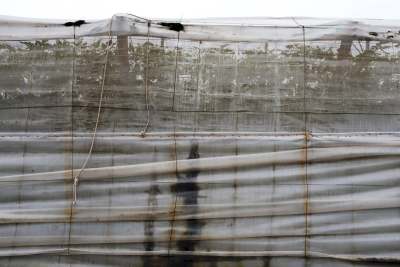
How are UK supermarkets connected to the abuses?
The UK imports more fresh produce from Spain than from any other country, and most of this ends up on supermarket shelves. Much of this comes from key exporting regions Almeria and Huelva, where workers’ rights abuses are widespread.
One in every 6 tomatoes eaten in the UK is likely to be from Almeria from December to February. Over 60% of strawberries in the UK are likely to come from Huelva in between January and March.
Around 25% of the UK’s pepper imports come from Almeria, and 12.5% of tomato imports. Over half of the UK’s raspberry, blackberry, mulberry and loganberry imports are from Huelva, and half of our strawberry imports.
It is highly likely that all major UK supermarkets source from Almeria and Huelva. Most supermarkets have been directly linked to at least one workers’ rights allegation in the past.
Take action
Help fund our campaigns work by donating a solidarity subscription. This means we can keep spending time on campaigns like this and it helps someone who couldn't otherwise afford it to access our research and start spending ethically.
Find out more about our Pay It Forward solidarity subscription.
What do UK supermarkets need to do?
Supermarkets spend millions on produce from Almeria and Huelva every year. That means they have power to create change. They must take action now to tackle workers’ rights abuses on Spanish farms.
UN Special Rapporteur on extreme poverty and human rights Olivier de Schutter has joined calls for supermarkets to address conditions. “I urge supermarkets to end their complicity in this abuse and address the issue head on.”
Short-term solutions
There are a number of immediate steps supermarkets should take to improve the effectiveness of their supply chain policies:
- ensure supply chain policies cover all workers, down to those growing produce on farms
- publish names and addresses of the farms providing produce on their shelves
- audit farms as well as intermediary suppliers, including off-site worker interviews, ensuring that no management is present (in combination with long-term changes below, and recognising that auditing alone has limited effect)
- publicly report on the results of all audits
- end commercial or trading practices that place pressure on farms to cut costs. For example, contracts should be long-term, predictable and transparent and pricing should be set at an appropriate level for sustainable production costs
- commit to factor living wage into price negotiations and set a publish a timeline for this
Supporting workers to create long-term change
Short-term steps will not be sufficient alone to address the issues in the region. Initiatives such as voluntary social responsibility auditing have proven to be incapable of solving the endemic issues across the region.
In recent years, worker-driven social responsibility (WSR) mechanisms have been recognised as the ‘gold-standard’ for ensuring labour rights.
Workers in Spain are exploring possibilities around developing such a mechanism, and supermarkets should commit to fully supporting such mechanisms as they develop.
What are Worker-Driven Social Responsibility Mechanisms?
Under this type of model, workers define the conditions they want to be met and retailers such as supermarkets make legally binding commitments to only buy produce from suppliers that uphold these conditions.
“It’s simple: retail food giants commit to purchase from farms that respect workers’ rights and to cut-off purchases from those who violate their rights, with a dedicated monitoring body that listens to workers’ voices, protected against retaliation, monitoring and enforcing compliance,” Greg Asbed of the Coalition of Immokalee Workers, the organisation that championed the model, explains.
WSR models have already seen enormous success around the world (an example is in our ethical guide to jeans).
Background
Ethical Consumer has been reporting on issues for migrant workers in southern Spain since 2019. Ethical Consumer is working with local grassroots organisations to report on abuses as they are reported.
In May 2020, we launched a Crowdfunder with the local union SOC-SAT and the members’ organisation Collective of African Workers, to support those confined to the shanty towns, without running water during the coronavirus crisis. Thanks to the support of our readers, we raised over £25,000. As a result we were able to provide basic necessities and solar panels to help improve their living conditions.
Our work on this campaign has been featured by media such as The Guardian, New Internationalist and The Observer and Spanish media such as El Pais.
We are working with a network of partner organisations such as Anti-Slavery International, the Coalition of Immokalee Workers and The Landworkers’ Alliance.
We have contacted all major UK supermarkets on the issues highlighted, as well as voluntary initiatives and certification schemes involved in the region. You can read their responses to the allegations in our report.
*Names have been changed to protect the identities of workers.
Ongoing reports
Ethical Consumer will be publishing ongoing reports about the situation in southern Spain. Recent articles are linked to below.
- The reality of Spain's agricultural sector (January 2026)
- The experience of seasonal workers on UK farms
- What are Worker-driven Social Responsibility programmes? (Sept 2025)
- UK supermarkets breaching UNGP human rights commitments - July 2025
- Mass eviction of farm workers in southern Spain - March 2025
- Open letter to the mayor of Nijar - November 2024
- EU legislation to end forced labour in supply chains - September 2024
- Groundbreaking workers’ rights model to be explored in Spain - April 2024
- Report: Supermarkets and migrant workers’ rights abuses in Spain - March 2023
- Migrants in supermarket supply chains face “horrific” conditions - March 2023
- Shortages show UK reliance on Spanish and Moroccan fruit and veg pickers - March 2023
- Case study of an unethical agricultural producer in southern Spain: Biosabor - January 2023
- Strawberries and the impact on a Spanish national park - May 2022
- New documentary exposes conditions for undocumented migrant workers - April 2022
- Workers for Bio Looije fight back in court - April 2021
- Taken to court for installing solar panels - April 2021
- 500 agricultural workers left homeless after fire in Almeria - February 2021
- Supermarkets call on Spanish Government to act - November 2020
- Workers fired for talking about coronavirus on Spanish farms - November 2020
- “It’s like living in hell”: Life for Moroccan workers stranded in Spain during pandemic - July 2020
- UN condemns “inhuman” conditions for strawberry pickers in Huelva - April 2020
- “If you don’t want to work like a slave, you’re out.” Life for migrant fruit pickers - April 2020
- Worker sues Spanish government over pandemic conditions - April 2020
- Crowdfunder appeal: Vital supplies needed for workers in the settlements of Southern Spain - April 2020
- Workers growing vegetables for UK supermarkets laid-off and threatened with eviction - February 2020
- Supermarkets and certification failing Spanish workers - December 2019
- Bitter fruit: labour exploitation in Andalusia and Morocco - May 2019
- Successful workers' strike in Almeria - May 2019
- Poor conditions faced by agricultural workers in Almeria - February 2019
Subscribe to Ethical Consumer
All the information and inspiration you need to join thousands of others and revolutionise the way you shop, save and live. Full online access to our unique shopping guides, ethical rankings and company profiles. The essential ethical print magazine.

- 6 issues of Ethical Consumer Magazine in print and/or digital format
- 12 months full access to all Shopping Guides and Company Profiles
- Special discount offers from selected Best Buy companies.
- Digital versions of our entire catalogue of back issues.
